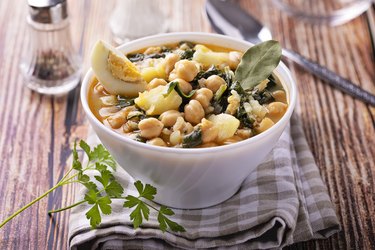
What doesmenopausehave to do with chickpeas? More than you might expect. The potential connection between the two has to do with the hormone estrogen, and the risk that can develop when estrogen levels climb too high.
Hormones and the Road to Menopause
Menopause is a time that increases your risk of high estrogen levels. During child-bearing years estrogen is key to stimulating breast tissue growth, maintaining good vaginal blood flow and moisture, thickening the uterus' lining during the menstrual cycle and promoting vaginal elasticity, according to theNorth American Menopause Society(NAMS). And another hormone, progesterone, is critical to ensuring that the lining of the uterus is prepared to receive and host a fertilized egg.
Video of the Day
But according to the NAMS, the transition to menopause (perimenopause) that typically begins by your 40s can throw the balance between estrogen and progesterone out of whack: Estrogen production starts to fall and progesterone production halts altogether.
And that can leave both perimenopausal and menopausal people in a state of so-called estrogen dominance. The condition is defined by an estrogen-progesterone imbalance, in which estrogen levels are too high relative to progesterone levels, according to the Women in Balance Institute at theNational University of Natural Medicine(NUNM), in Portland, Oregon.
Indeed, the NUNM points out estrogen dominance can actually unfold at any age. In fact, apart from menopause, another big driver is stress, as an increase in the production of the stress hormone cortisol triggers a parallel drop in progesterone production.
But regardless of when and why it develops, the problem, per the NUNM, is estrogen dominance has been linked to a number of health concerns. Those include breast cancer, breast tenderness, heavy bleeding, painful cramps, depression and mood swings.
To that list theEndocrine Society增加了一个疲劳的风险增加,利比do, increased anxiety and weight gain.
And researchers, such as those reporting inBiomedicine & Pharmacotherapyin June 2018, say taming estrogen imbalance is not an easy task, with the focus so far on dietary and lifestyle factors.
But what does this have to do with chickpeas?
Chickpeas and Phytoestrogen
Chickpeas do not contain estrogen. However, chickpeas do contain an estrogen-like plant compound called phytoestrogen.
Chickpeas aren't the only plantfood to contain phytoestrogen. Some other examples are whole grains, dried beans, peas, fruits, broccoli, cauliflower and soy, according toBreast Cancer Prevention Partners.
No human studies have been done on the chickpea and its possible estrogenic effects, but animal studies, such as April 2018 research inCellular and Molecular Biology, have specifically set out to assess the effects of chickpea phytoestrogens. In that study, the researchers concluded the extract indeed had strong estrogen-like effects and bone-protecting activity in rats, and noted that human studies would be helpful in examining chickpeas as a potential therapeutic agent.
That's the good news. But if chickpea's estrogen-like effect is really that significant in humans, might eating them be a problem for those already struggling with the excessively high estrogen levels brought on by conditions like estrogen dominance?
Related Reading
Chickpeas and Estrogen Dominance
Not everyone thinks so. In fact, that concern was dismissed out of hand by registered dietitian nutritionistLona Sandon, PhD, RDN项目负责人。教授和副极为痛心r in the Department of Clinical Nutrition at the University of Texas Southwestern Medical Center at Dallas.
"No," she said flatly. "One would need to eat a lot of chickpeas, every day."
But a fellow nutritionist believes the matter isn't that clear. "The research on phytoestrogens and health, no matter which food they come from, remains mixed," saysConnie Diekman, MEd, RD, former president of the American Dietetic Association (now called the Academy of Nutrition and Dietetics) and former director of University Nutrition at Washington University in St. Louis, Missouri.
"Some studies show phytoestrogens can function just like naturally occurring estrogen in helping preserve bone health and prevent disease," she says. "But other studies indicate caution is sometimes needed in terms of the quantity consumed."
Still, Diekman says most people could benefit from adiet based more on plant foodsthan meats. "So I would say choosing plant proteins that contain phytoestrogens — like soy, beans, nuts and seeds — is generally good for us," she says. "But consume them as part of a healthful eating plan, in portions that are appropriate for your body size and activity level."
Related Reading
- North American Menopause Society: "Changes in Hormone Levels"
- National University of Natural Medicine, Women in Balance Institute: "Causes of Hormone Imbalance"
- Endocrine Society: "What Is Estrogen?"
- Breast Cancer Prevention Partners: "Phytoestrogens"
- Cellular and Molecular Biology: “In Silico Estrogen-like Activity and in Vivo Osteoclastogenesis Inhibitory Effect of Cicer arietinum Extract”
- Biomedicine & Pharmacotherapy: “Estrogen: The Necessary Evil for Human Health, and Ways To Tame It”
- Lona Sandon, PhD, RDN, LD, program director, associate professor, Department of Clinical Nutrition, School of Health Professions, University of Texas Southwestern Medical Center, Dallas
- Connie Diekman, MEd, RD; food and nutrition consultant; former president, American Dietetic Association; coauthor, "The Everything Mediterranean Diet Book"; former director, University Nutrition, Washington University in St. Louis, Missouri
Is this an emergency?If you are experiencing serious medical symptoms, please see theNational Library of Medicine’s listof signs you need emergency medical attention or call 911.